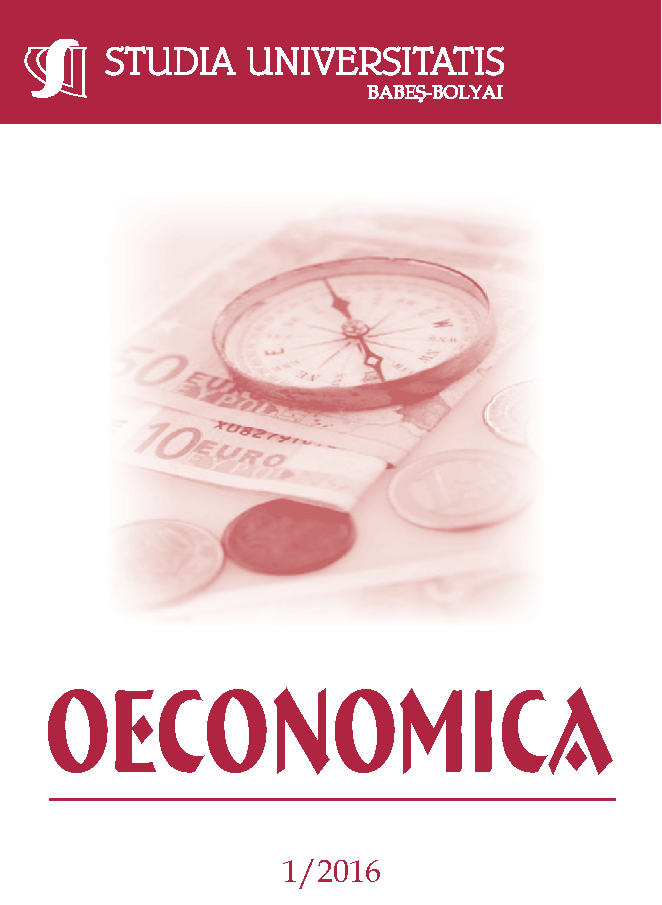HIGHER EDUCATION FOR PROVIDING SERVICES COMPANIES WITH GOOD RESULTS
Keywords:
competence, concern for employees and customers, job satisfaction, professional development, specialization in management/tourismAbstract
This paper presents the results of a sociological survey regarding the opinions of a group of 304 students (in Management and Tourism) on the level of trust in the organizations they own or are employed by. The findings highlight the status of organizational trust in the surveyed companies. On the other hand, we follow the opinions of the students regarding the possibilities to improve the education and learning process, for a better training of managers and employees in service-providing companies, for high efficiency of activities and to improve the relationship with the clients. The objective of this approach is to obtain a global image of the level and results of organizational trust in the companies where the students work, but also to identify the common, respectively, the different aspects of the improvement of teaching curricula and processes in the two faculties, the final reason being to increase the efficiency in service providing and to recover the activity in the field of tourism.
JEL Classification: O15
References
Abrudan, I., 2012, Cultură managerială. Managerial culture, Cluj-Napoca (Romania): Digital Data Cluj.
Arrow, K., 1974, The Limits of Organization, Norton, New York.
Barber, B., 1983, The Logic and Limits of Trust, Rutgers University Press, New Brunswik.
Burt, R., Knez, M., 1996, “Third-Party Gossip and Trust”, in R. M. Kramer & T. R. Tyler (eds.), Trust in Organization, Sage, Thousand Oaks.
Câmpeanu-Sonea, E., 2012, Managementul firmei prestatoare de servicii în turism, RISOPRINT, Cluj-Napoca, Romania.
Câmpeanu-Sonea, E., Sonea, A., 2015, “Opinions on Organizational Trust Development. A Comparative Study”, Managerial Challanges of the Contemporary Society, RISOPRINT, Cluj-Napoca, Romania.
Câmpeanu-Sonea, E., Sonea, A., 2011, Evoluţia resursei umane în context organizaţional, Cluj-Napoca România Editura RISOPRINT.
Coleman, J., 1990, Foundations of Social Theory, Harvard University Press. Cambridge.
Diaconu, R., 2015, “Iulie 2015: Turismul scade, cresc cifrele în turism”, http://cursdeguvernare.ro/, 01 Sep 2015.
Fine, A. & Holyfield, L., 1996, “Secrecy, Trust, and Dangerous Leisure: Generating Group Cohesion in Voluntary Organizations”, Social Psychology Quarterly, 59, 22-38.
Garfinkel, H., 1963, “A Conception of, and Experiments with, Trust as a condition of Stable Concerted Actions”, in O. J. Harvey (editor), Motivation and Social Interaction: Cognitive Determinants, Ronald, New York.
Hardin, R., 1991, “Trusting Persons, Trusting Institutions”, in R. J. Zeckahuser (ed.), Strategy and Choice, MIT Press, Cambridge.
Hardin, R., 1992, The Street-Level Epistemology of Trust, Analyse & Kritik, 14, 152-176.
Hardin, R., 2002, Trust and Trustworthiness, New York: Russell Sage Foundation.
Hollis, M., 1998, Trust Within Reason, Cambridge University Press, Cambridge, UK.
Hosmer, L. T. (1995), “Trust: The Connecting Link Between Organizational Theory and Ethics”, Academy of Management Review, 20, 379-400.
Kramer, R. M. (editor), 2009, Organizational Trust. A Reader, Oxford Management Readers, Oxford University Press, New York, USA.
Kreps, D. M., 1990, “Corporate Culture and Economic Theory”, in J. Alt & K. Shepsle (editors), Perspectives on Positive Political Economy, Cambridge University Press, New York.
Lewis, J. D. & Weigert, A., 1985, “Trust and Social Reality”, Social Forces, 63, 967-985.
Luhman, N., 1988, “Familiarity, Confidence, Trust: Problems and Alternatives”, in D. Gambetta (editor), Trust: Making and Breaking Cooperative Relations, Oxford University Press, Cambridge, 94-108.
March, J. G., 1994, A Primer on Decision Making, Free Press. New York.
Miller, G. J., 1992, Managerial Dilemmas: the Political Economy of Hierarchies, Cambridge University Press, New York.
Pană, M., 2015, “Statistica a confirmat rezultatul de 0.1% al PIB trimestrial. De unde a venit creşterea”, in http://cursdeguvernare.ro/, 05 Sep 2015.
Robinson, S. L., 1996, “Trust and Breach of the Psychological Contract”, Administrative Science Quarterly, 41, 574-599.
Schelling, T. C. 1960, The Strategy of conflict, Yale Univercity Press, New Haven.
Shockley-Zalabak, P. S., Morreale, S., Hackman, M., 2010, Building the High-Trust Organization: Strategies for Supporting Five Key Dimensions of Trust, John Wiley & Sons, San Francisco, USA.
Shockley-Zalabak, P. S., 2015, Fundamentals of Organizational Communication: Knowledge, Sensitivity, Skills, Values, PEARSON Education, New Jersey, USA.
Sonea, A. 2014, „Customer Trust in the Organization. The Case of a Banking Institution”, Literature, Discourse and Multicultural Dialogue, Targu Mures, Romania.
Sonea, A., Câmpeanu-Sonea, E., Popa, T., 2015, „Determining the Level of Organizational Trust. The Case Study of a Romanian Company”, Rethinking Social Action. Core Values – RSACV 2015, LUMEN, Iasi, Romania.
Williamson, O., 1993, Calculativeness, Trust, and Economic Organization, Journal of Law Economics, 34, 453-502.
*** “Services, etc., value added (% GDP)|Table”, 2015, The World Bank, Data, Indicators, http://data.worldbank.org/indicator/NV.SRV.TETC.25, 05 Sep 2015.
Downloads
Published
How to Cite
Issue
Section
License
Copyright (c) 2016 Studia Universitatis Babeș-Bolyai Oeconomica

This work is licensed under a Creative Commons Attribution-NonCommercial-NoDerivatives 4.0 International License.






